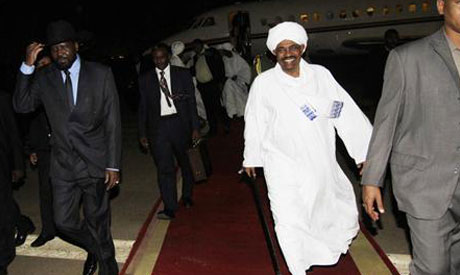
Sudan's President Omar Hassan al-Bashir (R) & S.Sudan's President Salva Kiir (L) as he steps off the plane from Chad, in Khartoum July 23, 2010. (Photo: Reuters)
Sudan and South Sudan prepared Tuesday for their first direct talks since deadly border fighting last month took them back to the brink of war, even as the South accused its arch-foe of fresh air raids.
"Today as we speak they bombed us," South Sudan's top negotiator Pagan Amum told reporters in the Ethiopian capital, where teams from both sides have flown to restart African Union-led talks, expected to open late Tuesday.
Amum said Sudanese war planes bombed border areas in three Southern states -- Unity, Western and Northern Bahr el Ghazal -- in the fourth day of reported attacks that Khartoum has dismissed as lies and were not immediately possible to verify independently.
However, Amum said the South would still take part in the talks, which were stalled by heavy clashes last month, the worst fighting since the South won independence last July. "We are attending no matter what," he said.
The UN Security Council earlier this month ordered both sides to cease fighting and return to talks or face possible sanctions.
Khartoum has in turn accused the South of alleged cross-border incursions, which it said broke the UN order to halt hostilities.
Sources close to the talks said Khartoum's delegation arrived in the Ethiopian capital on Tuesday morning.
Khartoum, in an apparent peace gesture, has promised to end a year-long occupation of the contested Abyei region, a Lebanon-sized area whose ownership is a key issue for Juba and Khartoum. Troops were due to pull out on Tuesday.
Sudanese troops stormed the region in May 2011, forcing some 110,000 people to flee southwards, where the majority remains in impoverished camps.
"Sudan decided to redeploy the troops out of Abyei area to offer a good environment for the talks," Sudanese army spokesman Sawarmi Khaled Saad said in a statement.
However, he said the troops would pull out on condition Khartoum received a "guarantee" the area is part of its territory.
Abyei was to have held a referendum in January 2011 on whether it belonged with the north or South, but that ballot was stalled over disagreement on who could vote, and Juba is highly unlikely to agree to relinquish its claim.
But Amum accused Khartoum not honouring its pledge and said that Sudanese troops remained in Abyei, calling for international action against Sudan.
"We call on the Security Council and the AU to take measures against the Republic of Sudan," he said, without elaborating.
"We will put a clear list... of violations by the government of Sudan, including their failure to withdraw their forces from Abyei," he said, but added that his government remained committed to talks.
Khartoum has said "security issues should be addressed first," according to the Sudanese Media Centre (SMC), which is close to the security apparatus, adding that it is unhappy with Southern maps marking contested regions as their territory.
South Sudan broke away from Sudan in July after a 2005 peace deal ended one of Africa's longest civil wars, which killed about two million people.
But tensions soon flared again over a series of unresolved issues, including the border, the future of disputed territories and oil.
The South separated with about 75 percent of the former united Sudan's oil production, but Juba still depends on the north's pipeline and Red Sea port to export its crude.
A protracted dispute over fees for use of that infrastructure led South Sudan in January to shut its oil production after accusing the north of theft.
Khartoum however has said that no other issues will be addressed in the talks until the question of border security is resolved, according to the SMC.
Aid agencies have raised concerns over the plight of civilians in border areas, as well as the fate of thousands of people living on the wrong side of the border struggling to comply with orders to return to their homeland.
At least 350,000 Southerners remain in Sudan -- many of whom have spent decades there after fleeing the 1983-2005 civil war -- and thousands of Sudanese live in the South.
Short link: